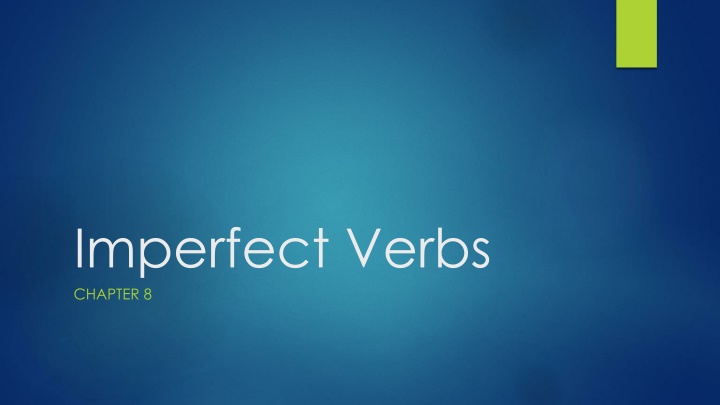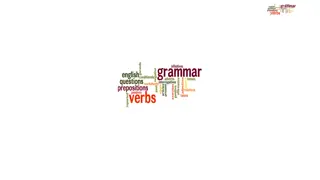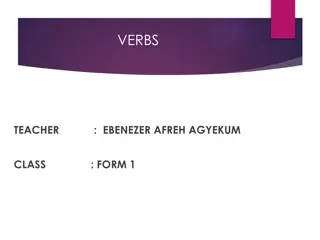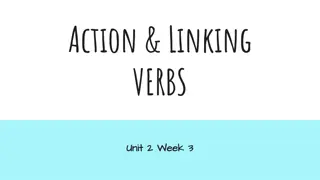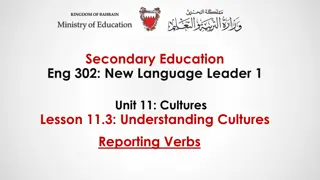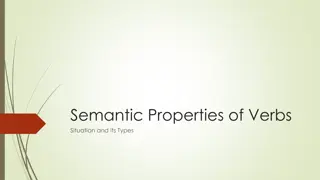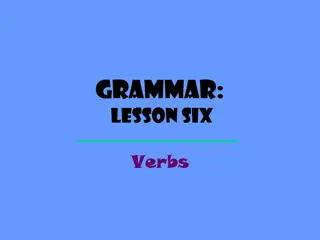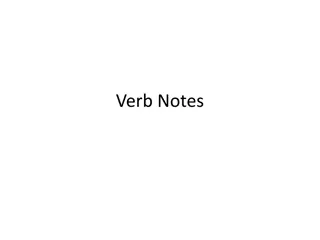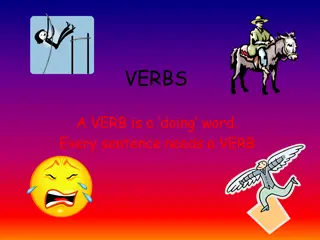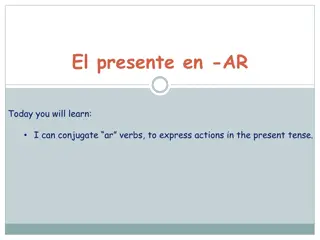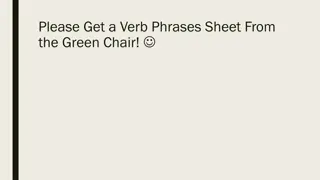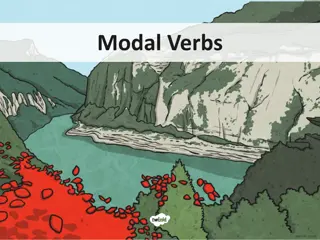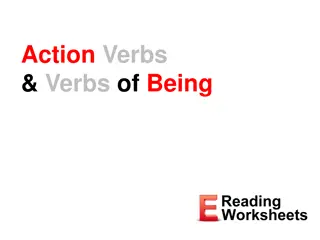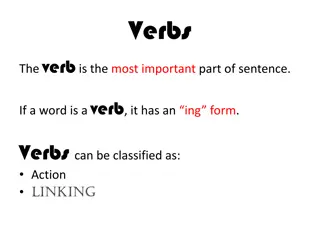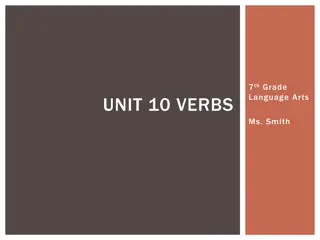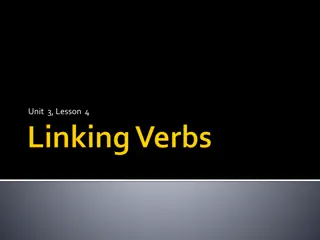Unlocking the Power of Imperfect Verbs in Chapter 8
Explore the nuances of imperfect verbs in Chapter 8, focusing on qal imperfect morphology and chant. Learn about the prefixes, suffixes, and preformatives that enhance your understanding of this key aspect of language.
Download Presentation

Please find below an Image/Link to download the presentation.
The content on the website is provided AS IS for your information and personal use only. It may not be sold, licensed, or shared on other websites without obtaining consent from the author.If you encounter any issues during the download, it is possible that the publisher has removed the file from their server.
You are allowed to download the files provided on this website for personal or commercial use, subject to the condition that they are used lawfully. All files are the property of their respective owners.
The content on the website is provided AS IS for your information and personal use only. It may not be sold, licensed, or shared on other websites without obtaining consent from the author.
E N D
Presentation Transcript
Imperfect Verbs CHAPTER 8
as one brothers dwell How good and pleasant it is when brothers live together in unity! and how pleasant how good behold (repeat) Chorus: How good when brothers live together in unity! How good when brothers live together in unity!
Demonstrative Pronouns: this and that This / these that / those who, which / /
Introduction A Logos search reveals that there are about 50,000 qal verbs out of a total 74,017 verbs total in the Tanak 21,000 being Qal Perfect; 23,440 being Qal Imperfect So the Qal is the major stem over all others and splits almost evenly between the perfect and imperfect forms.
Introduction The perfect is a suffixing verbal form adding endings onto the end of the verbal form. As we have learned with and etc. mostly translated into our past tense I guarded, you guarded The imperfect will be a prefixing verbal form with prefixes added to the front of the verbal form and often translated as a future. Hence we will get forms such as: (I will guard) and (you will guard).
Qal Imperfect Morphology 1CS 1CP I will keep we will keep 2MS you (m.) will keep 2MP you (m.) will keep you (f.) will keep 3MP 2FS you (f.) will keep 2FP 3MS he will keep they (m.) will keep 3FS she will keep 3FP they (f.) will keep
Qal Imperfect Chant 1CS 1CP 2MP 3MP 2MS 2FS 2FP 3MS 3FS 3FP
Imperfect Prefixes and suffixes 1CS 1CP 2MP 2MS 2FS 2FP 3MP 3MS 3FS 3FP
Attaching the preformatives Preformatives are generally attached with a req (exception: 1CS where a segh l is used) and the stem vowel is a lem which is reduced to a ev when a vocalic suffix is added (e.g. , , ) The lem is retained when the heavy suffix ending is added (e.g. ). There are two duplicate forms: 1) the 2MS = 3FS ( = you [m.] will keep and she will keep) and 2) the 2FP=3FP ( you [f.] will keep or they [f.] will keep).
Paragogic Nun On occasion a Paragogic Nun is suffixed on the 3MP and 2MP imperfect verbal forms that both normally end in a req. It does not impact the meaning. Hence instead of for the 2MP is written or defectively as (you [m] will keep). Similarly, for the 3MP instead of it is sometimes is written as or defectively as .
8.D. A Few Other Regular Verbs to bless, praise to gather to remember to visit to write to approach to make a covenant to kill to rule to break to rule to judge
Stative Verbs Fientive verbs are our normal verbs of action (e.g. he looked, she stood). Stative verbs describe a state of being You are strong. They can be classified according to the second vowel that is manifest when the 3MS perfect form or imperfect paradigms are examined: 1) Pata Stative, 2) er Stative or 3) lem Stative. They are formed normally in the Perfect paradigm except for the 3MS when the special root form is manifest as seen in the chart below.
Stative Verbs In the Imperfect verbal forms, however, rather than the normal second stem vowel being a lem switches to a pata in all three cases without regard to the original root vowel in the stative verb form. Pata Stative er Stative to be heavy to be small to be wise to be old to be holy to be afraid to be strong lem Stative to be great to be able
Pata Stative Paradigm: 1CS I am great 1CP we are great 2MS you(m.) are great 2MP you (m.) are great you (f.) are great 3MP they (m.) are great they (f.) are great 2FS you (f.) are great 2FP 3MS he is great 3FS she is great 3FP
er Stative Paradigm: to be heavy, honor 1CS 1CP I am honored we are honored 2MS you (m.) are honored 2MP you (m.) are honored 2FS you (f.) are honored 2FP you (f.) are honored 3MS 3MP 3FP he is honored they (m.) are honored 3FS she is honored they (f.) are honored
lem Stative Paradigm: 1CS 1CP 2MP I am small we are small 2MS you (m.) are small you (m.) are small 2FS 2FP you (f.) are small you (f.) are small 3MS 3MP he is small they (m.) are small 3FS 3FP she is small they (f.) are small
8.G. Negation: 3 ways to say no We have learned so far that is the most common way of saying a negative no. It is usually placed directly in front of the accompanying verb as a permanent prohibition as in the ten commandments thou shalt not . Secondly, or permanent but more limited to a specific context. is used in cases that are not Thirdly, or more frequently in the construct state is a substantive standing just before a noun that it negates ( nothing of the book is good Harris, p. 43).
8.H. Parsing form: Qal Impf. 2FS from meaning you (f.) will keep Qal Impf. 3MP from meaning they (m.) are honored
8.I. Chapter 8 Vocabulary List after, behind 618 no, not, nothing 694 to bless, praise 330 David 1,075 Moses 766
8.I. Chapter 8 Vocabulary List also, even, moreover 769 what? how? 757 to rule, be king 348 to visit, number, appoint 320 under, below 510
8.J. Speak: Lesson 8 Imperfects ? I feel like (lit. it comes to me) ice cream , Yes, how much is it? , I don t have any, I m sorry All right Enough/stop it Good-bye
7. I. Chapter 7 Vocabulary List good great much, many, great very (adv.), might (N.)
7. I. Chapter 7 Vocabulary List this (m.s. / f.s.) / face, front year heart, mind /
7. I. Chapter 7 Vocabulary List there, thither thus, so
6.L. Chapter 6 Vocabulary List spring, eye servant, slave Priest Egypt
6.L. Chapter 6 Vocabulary List Brother who, which, because Head Daughter
6.L. Chapter 6 Vocabulary List Water man, mankind, Adam
5.G. Chapter 5 Vocabulary List to, into, towards in, at, with, among, from like, as because, that, for, when
5.G. Chapter 5 Vocabulary List for, to, until, towards from, out of, because, since until, while, toward town, city
5.G. Chapter 5 Vocabulary List on, upon, above, over with
Chapter 4 Vocabulary List son, descendant all, each, every way, road hand, forearm
Chapter 4 Vocabulary List name behold! lo! soul, life heavens, sky
Chapter 4 Vocabulary List to hear, listen, obey law, instruction
Chapter 3 Vocabulary father, ancestor God, god to say house, palace, dynasty
Chapter 3 Vocabulary to be, become, happen to remember, mention to write people
Chapter 3 Vocabulary to slay, kill to keep, watch over, guard
Chapter 2 Vocabulary land, earth, ground man, human woman, wife word, matter, thing
Chapter 2 Vocabulary to go, walk Yahweh, Jehovah, LORD day, daylight, time Israel
Chapter 2 Vocabulary no, not king, ruler, prince
